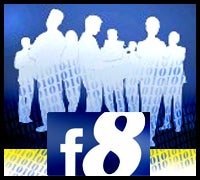 |
SAN FRANCISCO — They used to say there was no money in social media. You wouldn’t know it at f8, the Facebook developer’s conference held earlier this week in San Francisco.
It seemed like half the exhibitors at the event, which attracted about 1,000 developers and wannabes, wanted to show app developers how to monetize their Facebook widgets and applications. (The company says there are approximately 400,000 people developing for its platform). Also showing up were social media marketing companies that are — or hope to — help major advertisers make that social connection. For example, Terralever, a Tempe, Ariz. agency, was showing off the work that helped Red Bull become an early player.
Like a lot of today’s startup ecosystems, the Facebook app business is mostly based on ads and, to a lesser extent, on affiliate marketing. And, while Google ads are the monetization medium of choice for Web 2.0 startups, the Terminator of Search hasn’t yet been able to cash in The Social.
Instead, there are ad networks specific to social media, such as OfferPal Media, which lets developers do affiliate marketing to their users, and RockYou, which both distributes widgets and lets developers install ads in them. According to SocialMedia, another company providing advertising for social media applications, such advertising is expected to reach $1.6 billion in 2008.
Paid subscriptions for apps, especially games, is another up-and-coming model. Facebook has been talking to developers about a payments platform it has in the works; in the meantime, some companies are using other methods to charge for subscriptions.
Playfish, a Facebook developer that offers three games including Who Has the Biggest Brain?, recently rolled out its own microtransaction system that lets gamers pay via a variety of systems, including PayPal and Google Checkout. Playfish COO Sebastien de Halleux comes from the world of video games, where players are quite willing to shell out for good games.
“We see Facebook as the big disruption to the videogame industry. Instead of having to go to the store to buy games, we saw the platform launch as a great opportunity to bring games to people where they are,” he told internetnews.com.
People can play Biggest Brain for free, or pay $9.99 a year to get special features, such as the ability to practice in private, without their Facebook connections knowing.
There are plenty of other business models now, with more to be invented, a panel of developers told the f8 audience.
“We’ll see every business model for Facebook apps in the next few years,” Joe Greenstein, CEO of Flixter, a service for sharing movie reviews, told the audience.
“New models will be invented in the next few months,” added Shervin Pishevar, CEO of Social Gaming Network. He pointed out that Facebook Connect will allow developers to publish their applications on their own sites, and that will open up new opportunities, such as running advertising on those sites.
Next page: Leveraging Facebook data
Page 2 of 2
Leveraging Facebook data
Selling anonymous, aggregated data on users could be a cash cow for Facebook and other large social media application providers, according to Tim O’Shaughnessy, CEO of LivingSocial, maker of tools for discovering and organizing personal interests. “Down the road, with us and everybody, leveraging the data Facebook gives will be an increasingly important revenue stream,” said O’Shaughnessy.
“It’s real people, their real connections, their real likes and dislikes. There’s a lot of data being accumulated but not being leveraged,” he added.
For example, millions of searches a month take place on the company’s site. He speculated that his company might develop a self-service advertising system where businesses or publishers could buy ads.
And then there’s venture money. This week Zynga, a service that combines online casual games with social networking, received $20 million from venture capital firm Kleiner Perkins, the firm that financed much of the first dot-com bubble (and saw stellar returns on its investments in a few companies like Google). In fact, Facebook is still running on money from Accel Partners.
Exhibitors at f8 say the thing to remember about Facebook development is that you can make money from your apps, just maybe not a lot. That’s seems fine with the crew of hackers and coders here, who just want to pay the rent and keep the fridge full of Red Bull … oh, and maybe, someday, sell themselves to Google.


